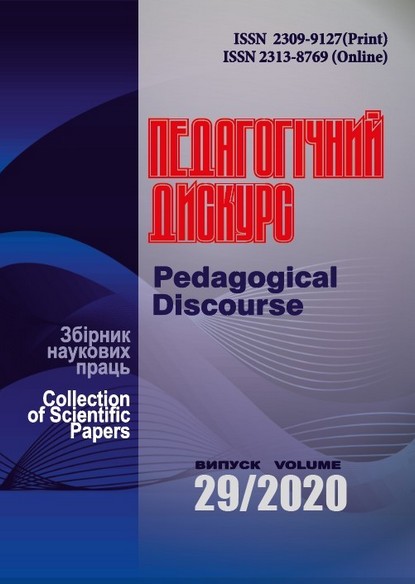Trends in Language Teaching and Learning Research: Analysis of the Publications in the Ukrainian Journal «Advanced Education»
Abstract
The aim of this qualitative study is to analyse literature on basic research methodology concerning methods, design, types of sampling, the sample size and recent scientific articles in the sphere of language teaching and learning to define current research trends. Twenty articles published in the open access Web of Science indexed journal «Advanced Education» were analysed in terms of scientific methods and sample size used. The journal is semi-annual and peer-reviewed. It highlights the results of scientific research on a wide range of topics in the field of higher education including language teaching and learning. The data was collected through content analysis of twenty publications in language education issued in 2020. Frequencies of methods used and percentages, as well as mean sample size, were calculated. A mixed-method approach was defined as a dominant trend in the majority of articles. It was demonstrated that the learning outcomes coefficient of 0.7 created by Bespalko V. is still used as a reliable way to measure learning outcomes in language teaching and learning research. The mean sample size of the experimental group was defined to be approximately 67 participants. A much bigger sample size was used for surveys. A growth of collaborative research in language teaching and learning was identified as one of the new trends in the sphere of language education in Ukraine. An increase in research cooperation with foreign colleagues was another emerging trend. Poland, the United States, Spain, Turkey, China, and Norway were on the list of research partners. In two out of twenty studies, foreign students were involved as research participants. They were Spanish and Polish learners. Popular methods of qualitative research such as observation, interview, survey, document analysis and the main characteristics of quantitative research were briefly described in the main part of this study based on the personal experience of the authors and analysis of literature dedicated to the theoretical background of research study methods.
Downloads
References
Berman, I. M., Buchbinder, V. A, & Plakhotnik, V. M. (1986). Osnovy’ metodiki prepodavaniya inostranny’x yazy’kov [Fundamentals of Teaching Methods of Foreign Languages]. Kyiv: Vyshcha shkola [in Russian].
Bespalko, V. P. (1968). Opy’t razrabotki i ispol’zovaniya kriteriev kachestva usvoeniya znanij [Experience in Developing and Applying Evaluation Criteria for Knowledge Acquisition]. Sovetskaja Pedagogika – Soviet Pedagogy, 4, 52–59 [in Russian].
Bihych, O. B., Borysko, N. F., Boretska, H. E. et al. (2013). Metodyka navchannia inozemnykh mov i kultur: teoriia i praktyka [Methodology of Teaching Foreign Languages and Cultures: Theoru and Practice]. Kyiv: Lenvit [In Ukrainian].
Vishnevskyi, O. I. (2010). Metodyka navchannia inozemnykh mov [Methods of Teaching Foreign Languages]. Kyiv: Knowledge [In Ukrainian].
Kvasova, O. H. (2009). Osnovy testuvannia inshomovnykh navychok i vmin [The Basics of Testing Foreign Language Skills and Abilities]. Kyiv: Lenvit [In Ukrainian].
Nikolaieva, S. Yu. (2008). Osnovy suchasnoi metodyky vykladannia inozemnykh mov [Fundamentals of Modern Methods of Teaching Foreign Languages]. Kyiv: Lenvit [In Ukrainian].
Andales, J. (2020). What is an Observation Checklist? Retrieved from: https://safetyculture.com/checklists/observation/ [in English].
Brown, J. D. (2001). Using Surveys in Language Programs. Cambridge University Press [in English].
Cronbach, L. J. (1951). Coefficient Alpha and the Internal Structure of Tests. Psychometrika, 16 (3), 297–334. Retrieved from: https://doi.org/10.1007/bf02310555 [in English].
Griffee, D. (2012). An Introduction to Second Language Research Methods: Design and Data. University of California: TESL-EJ Publications [in English].
Hashemi, M. R. (2012). Forum: Reflections on Mixing Methods in Applied Linguistics Research. Applied Linguistics, 33 (2), 206–212 [in English].
Korb, K. A. (2013). Conducting Educational Research. Steps. In Conducting a Research Study. Retrieved from: http://korbedpsych.com/R00Steps.html [in English].
Lodico, M. G., Spaulding, D. T., & Voegtle, K. N. (2010). Methods in Educational Research: from Theory to Practice (2nd ed.). San Francisco: Jossey-Bass [in English].
Mason, J. (1994). Linking qualitative and quantitative data analysis. In A. Bryman, R. G. Burgess (Eds). Analysing Qualitative Data (1st ed., pp. 89–110). London: Routledge [in English].
Mathers, N., Fox, N., & Hunn, A. (1998). Research and Development in Primary Health Care: Using Interviews in a Research Project. Sheffield: Trent Focus [in English].
Mehdi, R., & Candlin, C. N. (2014). Mixed-Methods Research in Language Teachingand Learning: Opportunities, Issues and Challenges. Language Teaching, 47, 135–173. doi: 10.1017/S0261444813000505 [in English].
Miles, M. B., & Huberman, A. M. (1994). Qualitative Data Analysis: An Expanded Sourcebook. (2nd ed.). Thousand Oaks: Sage Publications Inc. [in English].
Nunan, D. (1992). Research Methods in Language Learning. Cambridge, NY: Cambridge University Press [in English].
Patton, M. Q. (2002). Qualitative Research and Evaluation Methods. Thousand Oaks, CA: Sage [in English].
Rea, L. M., & Parker, R. A. (1992). Designing and Conducting Survey Research: A Comprehensive Guide. San Francisco: Jossey-Bass [in English].
Rosenkvist, L., & Bencic, N. (2020). Students’ Perception on Role-Play in EFL/ESL-Classrooms in Relation to Their Speaking Ability. Sweden: Malmo [in English].
Sarré, C., & Whyte, S. (2016). Research in ESP Teaching and Learning in French Higher Education: Developing the Construct of ESP Didactics. ASp. la revue du GERAS, 69, 139–164. doi: 10.4000/asp.4834 [in English].

This work is licensed under a Creative Commons Attribution-NonCommercial-ShareAlike 4.0 International License.

















